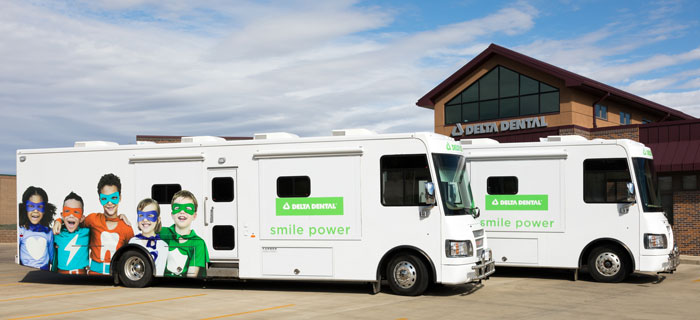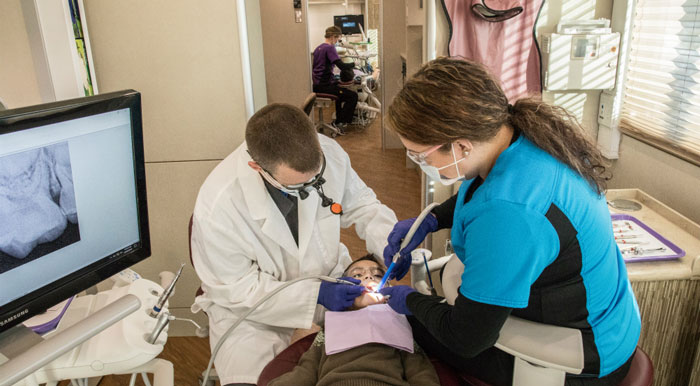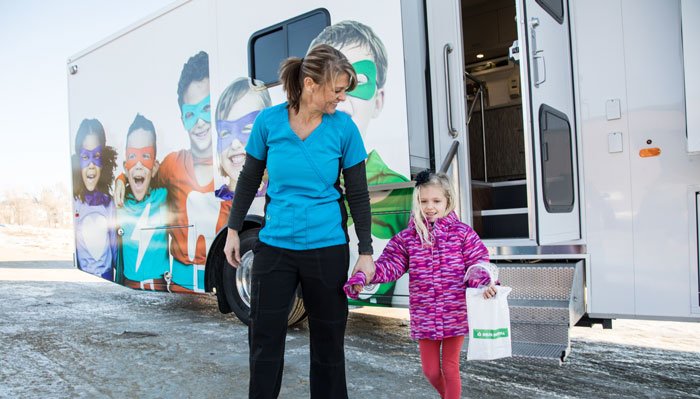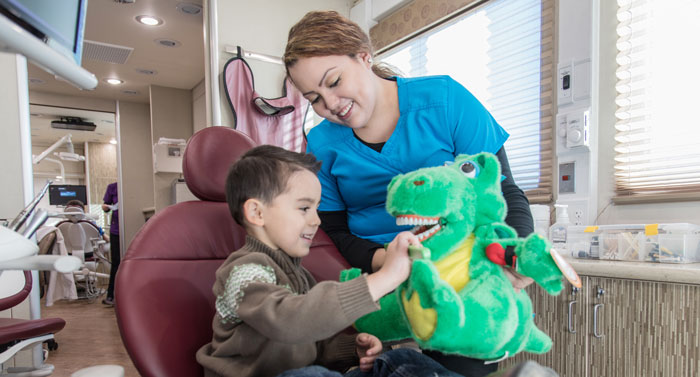Delta Dental Mobile Program
- Need: Lack of access to oral healthcare for children from limited-income families in the rural and urban areas of South Dakota.
- Intervention: Delta Dental of South Dakota launched the Delta Dental Mobile Program in 2004 to expand access to oral healthcare services to children throughout the rural state.
- Results: The Delta Dental Mobile Program has provided over $44 million in dental care to more than 73,000 South Dakota children.
Description
The Delta Dental Mobile Program provides oral healthcare to children who don't have access to dental care. The program, which began in 2004, currently includes a mobile dental clinic truck that travels the state and dental hygienists and community health workers based on the state's tribal reservations.
The Mobile Program serves approximately 2,500 kids across South Dakota every year. Care provided through the Mobile Program is at no cost to the child or family.
Mobile clinic truck
The truck is 40 feet long and contains two dental operatories for preventive, diagnostic, and restorative care.
Delta Dental of South Dakota operates and staffs the truck with a dentist, hygienist, two dental assistants, and a coordinator. Local community agencies host a truck visit, providing the location, promoting the clinic, and recruiting and registering patients.
It costs approximately $23,000 per week to operate the truck. Local sponsors contribute a modest stipend, generally $3,000 per week, for the clinic visit.
Children eligible for care are those through age 21 who have not seen a local dentist in the past two years or who live more than 85 miles from a dentist.
The mobile clinic truck serves approximately 1,500 kids every year and travels 42 weeks every year across the state.

Community-based care on tribal reservations
The Mobile Program also includes dental hygienists and community health workers in communities on South Dakota's tribal reservations who provide oral health education, preventive care clinics, and support to access urgent dental care.
This facet of the Mobile Program began in 2013 and has provided over $7 million in preventive care to more than 17,000 kids.
Mobile Program staff work with local schools and Head Start programs to host preventive care clinics for kids in grades K-8. Staff use portable equipment in a spare room at each location to provide oral health screenings, fluoride varnish treatments, and dental sealants.
This facet of the Mobile Program began with a 2012-2015 Centers for Medicare and Medicaid (CMS) Health Care Innovation Awards grant.
Services offered
The Delta Dental Mobile Program provides:
- Oral health education
- Preventive services such as cleanings, fluoride varnish, and dental sealants
- Restorative care
No child is turned away due to inability to pay. However, in order to be eligible to receive treatment on the truck clinic, a child:
- Must be aged 21 or younger
- Must not have seen a local dentist in the past two years OR
- Must live more than 85 miles from a dentist
The target population for the prevention clinics is elementary school children in communities where the Mobile Program has a presence. There are currently Mobile Program hygienists working full- or part-time on the Rosebud, Pine Ridge, Crow Creek, and Lower Brule Reservations.
Medicaid and other insurance products are accessed, if available.

Results
The mobile clinic truck has:
- Traveled to 86 different South Dakota communities
- Treated more than 73,000 children
- Provided more than $44 million in dental care
The community-based care on tribal reservations has:
- Visited over 168 different sites
- Provided care to over 17,000 patients
- Provided more than $7 million of care
The Delta Dental Mobile Program is also featured in RHIhub's Oral Health Toolkit Program Clearinghouse.
For more information about the mobile program, please watch this video:
Challenges
A mobile dental program is an expensive way to provide dental care. Many mobile programs operate in a geographical area where the staff return home each night. Since the Delta Dental Mobile Program truck travels to communities across South Dakota, staff are unable to sleep in their own homes each night and more expenses are incurred such as lodging, fuel, and vehicle wear and tear. Because of the amount of travel required, staff burnout is an issue.
Technology has also been a significant barrier. Operating at multiple locations utilizing electronic health records provides challenges, particularly at sites where there is no connectivity.

Replication
Advice from Delta Dental Mobile Program staff:
- Operating a mobile dental program is expensive, so it is important to have a solid source of income to cover expenses. Delta Dental of South Dakota covers roughly 75% of the mobile program's operating losses.
- Recruiting staff can be a challenge because of the extensive travel required.
- The mobile program truck has a lot of moving parts, so it's challenging to keep the trucks in top shape. When traveling on gravel roads and through blizzards, breakdowns of the vehicle, generator, or dental equipment happen quite frequently, and repair people are not always available in smaller communities.
- It's important to have high-quality dental equipment.
- There is a fair amount of information technology needed, and connectivity issues can be a problem in remote rural areas where cellular service is not available.
- Placing dental hygienists, who operate under collaborative supervision, in the field to provide preventive care on a consistent basis has not only increased access to care, but it has also increased knowledge of the importance of oral health.

Contact Information
Zach Parsons, Program Services ManagerDelta Dental of South Dakota Foundation
605.494.2558
zach.parsons@deltadentalsd.com
Topics
Children and youth
· Mobile and episodic healthcare delivery
· Oral health
· Tribal communities
States served
South Dakota
Date added
November 6, 2009
Suggested citation: Rural Health Information Hub, 2025 . Delta Dental Mobile Program [online]. Rural Health Information Hub. Available at: https://www.ruralhealthinfo.org/project-examples/626 [Accessed 4 March 2026]
Please contact the models and innovations contact directly for the most complete and current information about this program. Summaries of models and innovations are provided by RHIhub for your convenience. The programs described are not endorsed by RHIhub or by the Federal Office of Rural Health Policy. Each rural community should consider whether a particular project or approach is a good match for their community’s needs and capacity. While it is sometimes possible to adapt program components to match your resources, keep in mind that changes to the program design may impact results.
